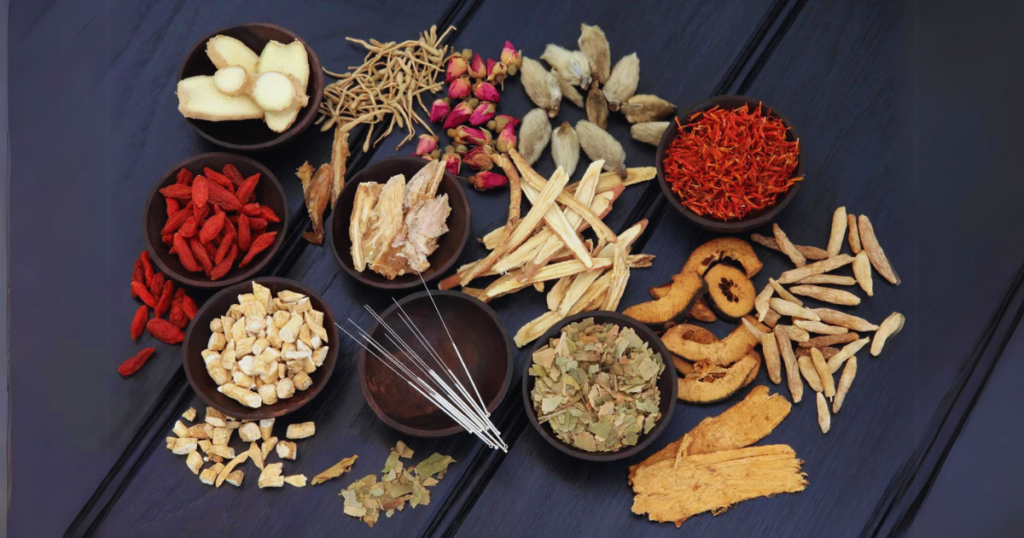Integrating Chinese herbal remedies is a time-tested and practical approach to pursuing sustainable, natural weight loss. With roots stretching back over 5,000 years, Traditional Chinese Medicine (TCM) has harnessed the power of various herbs to address weight concerns and broader health issues. This comprehensive guide delves into the top Chinese herbs for weight loss and well-being.
Understanding the Power of Chinese Herbs for Weight Loss
Chinese herbs offer a multifaceted approach to weight loss, influencing factors such as appetite control, fat burning, and systemic inflammation. This guide demystifies the benefits of critical herbs, providing valuable insights into their historical significance and proven effectiveness.
Ginseng Root (Xi Yang Shen)
Ginseng root, discovered over five millennia ago, has earned its reputation as a potent remedy. Studies suggest its role in weight management by curbing appetite and altering the gut microbiome composition.
Adenophora Root (Nan Sha Shen)
Derived from the ladybell flower, Adenophora root offers more than relief for dry coughs.
Its anti-obesity effects, driven by antioxidant and anti-inflammatory mechanisms, make it a valuable addition to weight loss routines.
Green Tea (Lu Cha)
Green tea’s rich history, dating back to the Han Dynasty, intertwines with its obesity-fighting prowess. Beyond weight loss, it boasts benefits like mental alertness and digestive relief.
Codonopsis Root (Dang Shen)
Codonopsis root, an adaptogen, aids the body in managing environmental stress. Studies reveal its connection to decreased body weight, mainly in high-fat diet scenarios.

Poria Cocos (Fu Ling)
Poria cocos, a unique diuretic mushroom, sheds water weight and shows promise against Alzheimer’s disease.
Black Atractylodes Root (Cang Zhu)
In traditional Chinese medicine, the root of the black atractylode addresses spleen and stomach issues. Its anti-obesity effects make it a compelling choice.
Chinese Red Date (Jujube)
The Chinese red date emerges as a fiber-rich superpower, promoting fullness and preventing excess food intake.
Mulberry Fruit (Sang Shen Zi)
Mulberry fruit extracts inhibit carbohydrate breakdown, impacting the glycemic index and contributing to weight loss.
Eucommia Bark (Du Zhong)
Native to China, the eucommia tree’s bark supports kidneys and hearts while promoting weight loss.
Unlock its potential by incorporating it into your routine. It is often consumed as a tea after being processed into flakes or powder.
Fennel Seed (Xiao Hui Xiang)
Fennel seed, known in holistic medicine, prevents the accumulation of excess fat.
Ginger Root (Sheng Jiang)
Ginger’s roots in ancient China and India prove its weight-reducing capabilities.
Incorporate ginger into teas, cooking, or supplements to benefit from its muscle-enhancing effects and increased endurance during exercise.

TCM Weight Loss Tips
Embrace Special Flavors in Your Diet
Sweet, salty, and fatty foods may promote TCM diets, but bitter, sour, and spicy flavors help combat weight gain.
Food digestion and weight management are soothed by Shan Zha (Fructus Crataegi), bitter melon (Karela), and relaxing Jiaogulan tea.
Jiaogulan tea’s calming taste and health benefits make it a good weight loss supplement for a balanced diet and moderate exercise.
Harness the Power of Acupuncture for Sleep and Stress Management
Studies show that poor sleep and stress, in addition to diet, can cause weight gain. TCM’s staple, acupuncture, helps control stress and sleep. By releasing endorphins, nature’s “feel good” hormones, acupuncture calms and reduces overeating.
Leverage Ear Acu-Pressure to Curb Food Cravings
Ear stapling in auricular acupuncture reduces food cravings by manipulating ear points. This method works for weight loss and tobacco and drug addiction. Acupressure with an adhesive tape containing vaccariae seed on critical ear acupoints balances intestinal energy flow, improving digestion.
Tap into the Potency of TCM Herbs for Fat Burn
Herbal remedies in TCM control hunger, increase metabolism, and burn fat. The weight-loss herbs He Ye (lotus leaf), Fu Ling, and Huang Qi are notable.
Try over-the-counter Chinese weight loss products like Bao He Wan, which combines herbs. Consult a TCM practitioner for a customized treatment plan for best results.
Embrace Sunlight and Movement
Seniors and those with specific conditions can do tai chi for a gentler workout.
Tai chi, a martial art, cuts tension and regulates weight with slow, deliberate movements and deep breathing. Tai chi reduces depression and anxiety and builds strength without consequences.

FAQs
Q.1 How Do Chinese Herbs Support Weight Loss?
Chinese herbs offer diverse mechanisms, including appetite suppression, fat burning, and inflammation reduction. Each herb contributes uniquely, presenting a natural and practical approach to weight loss.
Q.2 Is There a Chinese Herbal Tea for Weight Loss?
Numerous Chinese herbal teas support weight loss, including ginger, fennel, and green tea. While there isn’t a singular tea, incorporating these herbs into your daily routine can contribute to your weight loss journey.
Q.3 Do Chinese Herbal Slimming Patches Work?
Research emphasizes the efficacy of ingesting Chinese herbs for weight loss rather than using slimming patches. Consuming these herbs as teas, supplements, or part of TCM practices like acupuncture remains a preferred and researched approach.
Q.4 What is the TCM Approach to Healthy Weight Loss?
In TCM, a holistic approach considers the root cause of imbalances, often related to Qi flow. Acupuncture, herbs, acupressure, and dietary considerations align to create a comprehensive weight loss plan. Explore the seasonal perspective, emphasizing the harmony between nature, nutrition, and physical movement.
Q.5 What is the most potent herb for weight loss?
The hot-spring root is one of the most potent weight-loss herbs in TCM (Chuan Niu Xi). This herb helps to accelerate metabolism and accelerate fat loss, making it an appealing option for anyone attempting to shed unwanted weight.
Q.6 What is the herb that burns belly fat?
The herb commonly believed to help burn belly fat in TCM is Shen Qu (Medicated Leaven). Herbal remedies and supplements may also be combined to promote digestion, reduce bloating, and promote fat burning.
Q.7 What is the Chinese way of losing weight fast?
The Chinese approach to losing weight fast involves a combination of herbal remedies, acupuncture, and dietary changes. This holistic approach focuses on restoring balance in the body and promoting healthy digestion and metabolism. Exercise and mindful activities such as tai chi can also help speed up weight loss.
Q.8 Is mushroom coffee part of Chinese herbs for weight loss?
Mushroom Coffee is not a TCM way of weight loss. However, it has shown promising results, and incorporating it into daily life might help shed extra pounds!
Conclusion
Chinese herbs like Ginseng Root, Adenophora Root, Green Tea, Codonopsis Root, Poria Cocos, Black Atractylodes Root, Chinese Red Date, Mulberry Fruit, Eucommia Bark, Fennel Seed, and Ginger Root offer various weight loss benefits, including appetite control, fat burning, and systemic inflammation. These herbs can be added to teas, cooking, or supplements to promote fullness, lower glycemic index, and prevent excess fat accumulation.
